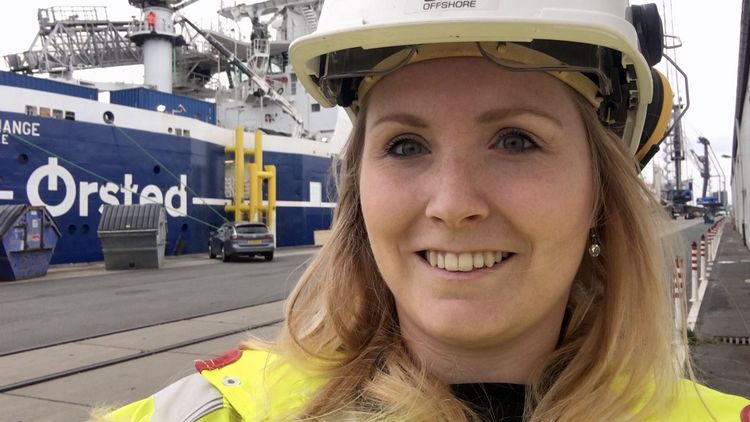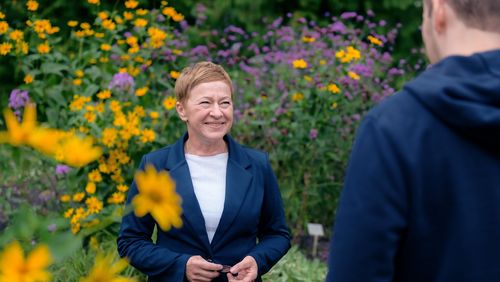Can you study law in Oldenburg? The answer is yes and no. The Hanse Law School (HLS) programme, jointly run by the Universities of Oldenburg and Bremen, is a little different to conventional law studies. Its comparative law profile and compulsory year abroad make it a unique option.
When HLS director Prof. Dr. Christine Godt is looking for former students to talk to her current students about their career prospects, she and her team are spoilt for choice. Because the careers of those who have completed a degree at the Hanse Law School could hardly be more diverse: graduates of the Bachelor’s degree course “Comparative and European Law” work at the European Commission, the Federal Foreign Office, the Office of the German Chancellery, international companies and major law firms as well as in the financial sector, management consultancies, professional and employee associations and NGOs.
"What really has a lasting impact on the students’ biographies is the compulsory year abroad – which is definitely unique," says Godt, a university lecturer in European and international commercial law at the University of Oldenburg since 2010. Since the winter semester she is once again co-director of the HLS, together with her Bremen-based colleague Prof. Dr. Christoph Schmid. “And depending on where you spend your time abroad, you have the possibility to set a certain emphasis,” adds Alexander Cordes, HLS coordinator on the Oldenburg side. “For example, one of our current students recently deepened her knowledge of Polish law in Stettin.”
It will be a while before HLS student Moritz Kesper packs his bags for his year abroad, but in his second year of studies he has been taking a closer look at Oldenburg and Bremen’s numerous partner universities to choose from for the coming academic year. “Regardless of where one ends up – together with the courses taught in English, the year abroad is one of the main advantages of this degree programme,” says the 20-year-old student.
He specifically chose the Hanse Law School, which offers 35 places on its Bachelor’s degree programme and another 35 on its Master’s programme “Transnational Law” each year. “The main reason was that I didn’t want to do the state examination, because I didn’t want everything to depend on a single exam.” For Kesper, another advantage compared to degree courses that end with the state examination is that such courses “don’t deal with European law until the fourth semester. We start with it in the first semester, which is great – also because I’m very enthusiastic about Europe and its achievements.”
In Godt’s view, the focus on comparative and European law is what defines the Hanse Law School. “It’s not just about the European harmonisation of laws, but about diversity within unity,” she stresses. “National laws and legal cultures play a major role, it’s about understanding differences and about friendship between peoples.” The programme’s comparative law profile, providing insights into English and French law in addition to deeper knowledge of German law, gives it a unique character, she says.
Dutch law occupies a special place in the programme because the Rijksuniversiteit Groningen has been a cooperation partner since the founding of the HLS in 2002. After a reform of the examination regulations, the three participating universities reintroduced the possibility for students to earn double Bachelor’s and Master’s degrees last year; and in the near future, students are also to have the option to complete German-French double degrees in a collaboration with the University of Le Havre.
However, the international degrees Bachelor of Laws (LL.B.) and Master of Laws (LL.M.) are by no means lightweight degree programmes focused only on core juristic content and training students for companies,” Christine Godt emphasises. “We aim to educate students to state examination level, even if the qualification is different. It’s just that we have other career paths in mind, beyond classic public service as a judge or public prosecutor.”
Moritz Kesper has similar ideas, and is “not necessarily interested” in becoming a lawyer. Born in Bremen, Kesper says he can imagine working at an EU institution or for a management consultancy firm later on. So far he has coped well with studying at two locations – under the recently reformed examination regulations, the German part of the programme is to be divided equally between Oldenburg and Bremen. “In the first two semesters I was in Oldenburg for the day on a regular basis, so I used the train journey to read study content.”
This past winter semester, all his courses were in Bremen, and he attended the same ones as students on regular law degree programmes, “although because our programme is broader-based I can’t deal with all the content in its full depth.” In addition to the legal content and legal English, the HLS students’ curriculum also includes a social sciences component with courses in economics, political science or cultural studies.
“With this approach we hope to broaden our students’ horizons in two respects,” HLS director Godt explains: “Namely by providing insights not just into other legal systems, but also into other disciplines.” When she surveys the career paths of HLS graduates, again and again she finds confirmation that this diversity is key to the Hanse Law School’s success.
Imke Bischoff (Master’s degree, 2016) is Contract Manager at Seaway Offshore Cables in the northern German town of Leer:
In my work it’s important that I’m not afraid to deal with different fields of law or legal systems. We lay submarine cables for offshore windfarms in the North Sea, the Baltic, offshore Scotland and Taiwan, and my tasks include the tendering process, contract negotiations and also project support.
Of the 100 colleagues from 18 nations working at this company location, five are HLS graduates. The working language is English, and the programme prepares you for that too. The company’s experience is that Hanse Law School graduates come with organisation talent and a great capacity for teamwork; you have to be well organised and good at networking during your studies. My Dutch language skills from my year abroad in Groningen are also a big advantage during lunch breaks with my Dutch colleagues.
Maya Wodnicka Bachelor’s degree in 2007 and then a Master’s degree in art law in Lyon) is a legal advisor at Natixis Bank in Hong Kong:
The curriculum, the international focus, and the people: for me, these are the three ‘pillars’ of the Hanse Law School. They have influenced a large part of my life, especially my academic path, personal development and career.
The focus on European and comparative law - coupled with the specialist vocabulary in various foreign languages - has opened up many professional avenues for me – all the way to a French bank in Hong Kong! European law has effects far beyond the physical borders of the EU, and I often deal with it in my work. The comparative approach used at HLS also comes in useful on a daily basis, as my team analyses international legal transactions in the Asian-Pacific and other regions.
In the course of my career, which initially took me to a major London-based law firm after completing my studies, I have been able to use all the languages I studied at HLS: German, English, Dutch and French. These language skills often prove invaluable in my work and when dealing with colleagues and clients from other regions of the world.
At the Hanse Law School I met a small but culturally diverse group of open-minded and really interesting fellow students - an enriching experience. I learned about new cultures and during my studies this small group of students facilitated a lively dialogue, both among themselves and with the teachers. Some of them have become very good friends of mine. And I also met my husband at the Hanse Law School! Dirk Behnsen works as a lawyer in Hong Kong where he specializes in restructuring and insolvency law at a major US law firm.




